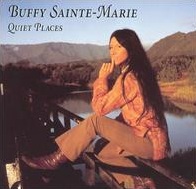
Buffy Sainte-Marie, is an American singer-songwriter, musician, and social activist.
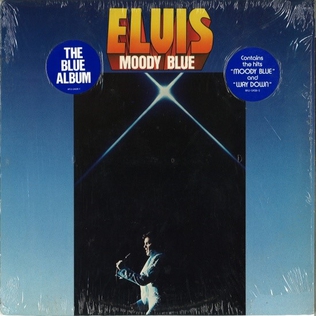
Moody Blue is the twenty-fourth and final studio album by American singer and musician Elvis Presley, released in June 1977 by RCA Records, about two months before his death. The album was a mixture of live and studio work and included the four tracks from Presley's final studio recording sessions in October 1976 and two tracks left over from the previous Graceland session in February 1976. "Moody Blue" was a previously published hit song recorded at the earlier Graceland session and held over for this album. Also recorded at the February session was "She Thinks I Still Care". "Way Down" became a hit after Presley's death less than one month after this album's release. The album was certified Gold and Platinum on September 12, 1977, and 2× Platinum on March 27, 1992, by the RIAA.

The Adventures of Panama Red is the fourth country rock album by the New Riders of the Purple Sage, released in 1973. It is widely regarded as one of the group's best efforts, and reached number 55 on the Billboard charts.

7-Tease is an album by the Scottish singer-songwriter Donovan. It was released in the US in November 1974 and in the UK in January 1975.
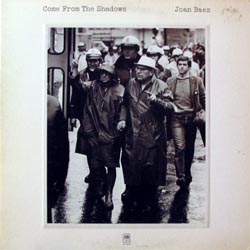
Come from the Shadows is the thirteenth studio album by Joan Baez, released in 1972. After recording for the independent label Vanguard for more than a decade, Baez signed with A&M and attempted to point her career in a slightly more "commercial" direction. In addition to her own compositions such as "Prison Trilogy","Love Song to a Stranger", "Myths", and "To Bobby", Baez included John Lennon's "Imagine", Anna Marly's "Song of the Partisan", and Mimi Fariña's "In the Quiet Morning ".

One Day at a Time is the 11th studio album by Joan Baez, released in January 1970. Recorded in Nashville, the album was a continuation of Baez' experimentation with country music, begun with the previous year's David's Album. It is significant in that it was the first to include Baez' own compositions, "Sweet Sir Galahad" and "A Song for David", the former song a ballad for her younger sister Mimi Fariña, and the latter song being for her then-husband, David Harris, at the time in prison as a conscientious objector. One Day at a Time also included work by The Rolling Stones, Willie Nelson, and Pete Seeger.

Good Times is the twentieth studio album by American singer and musician Elvis Presley, released on March 20, 1974. The album was constructed by the first pick of a session held at Stax Studios in Memphis in December 1973 and two songs, "I've Got a Thing About You Baby" and "Take Good Care of Her", which were left over from the session at Stax in July 1973. The album includes a collection of songs that vary in style and genre. Released the same day as the recording of Elvis: Recorded Live on Stage in Memphis was being made, the title was taken from the song "Talk About the Good Times". Many of the songs are covers of hits at the time, like "Spanish Eyes" and "She Wears My Ring". Charting low at the time of its release, it was considered typical 1970s Elvis material and was his first album to hit the "cut-out bins". The album did have some success though upon its original release, becoming a Cashbox Country Albums number 1 hit and charting in the Top 50 in the UK.

From Elvis Presley Boulevard, Memphis, Tennessee is the twenty-third studio album by American singer and musician Elvis Presley, released by RCA Records in May 1976. It became Presley's fourth album to reach #1 on the Billboard country music album sales chart within the last four years.

Norbert Auvin Putnam is an American musician, studio owner and record producer who was inducted into the Musicians Hall of Fame in 2019. He got his start as a bass player in the studio house band in Muscle Shoals, Alabama and from there was recruited to move to Nashville in 1965. He became a successful session player on recordings by artists including Roy Orbison, Al Hirt, Henry Mancini, Dan Fogelberg, Linda Ronstadt, J. J. Cale, Tony Joe White, the Nitty Gritty Dirt Band, Michael Card, Ian & Sylvia and Bobby Goldsboro. Putnam published a memoir in 2017 entitled Music Lessons Vol. 1: a Musical Memoir, in which he chronicled recording sessions with Elvis Presley and other artists.

Little Wheel Spin and Spin is the third album by Buffy Sainte-Marie, released in 1966. It was her only album to reach the Top 100 of the Billboard 200. Its most famous song is "My Country 'Tis of Thy People You're Dying," which displayed a native perspective on the colonisation of North America.

Illuminations is the sixth album by American singer Buffy Sainte-Marie, released in 1969 on Vanguard Records. From a foundation of vocals and acoustic guitar, Sainte-Marie and producer Maynard Solomon made pioneering use of the Buchla 100 synthesizer to create electronically treated vocals. It was also an early quadraphonic vocal album. The album's only single was "Better to Find Out for Yourself".

She Used to Wanna Be a Ballerina is the seventh album by Buffy Sainte-Marie, released in 1971.
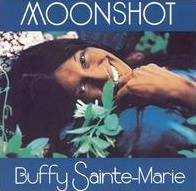
Moonshot is a studio album by American singer-songwriter Buffy Sainte-Marie, released in 1972 by Vanguard Records.

Buffy is the tenth album by Buffy Sainte-Marie and her first after she and Vanguard Records parted ways, with whom her relationship had not been on the best of terms for several years.

Changing Woman is an album by Buffy Sainte-Marie, released in 1975 via MCA Records. It was her second, and last, album for the label.
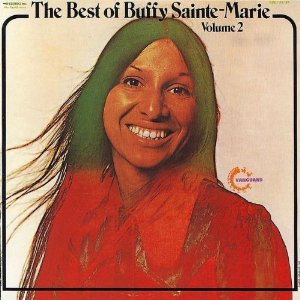
The Best of Buffy Sainte-Marie Vol. 2 is a compilation double album released by Vanguard Records in 1971 covering a large proportion of the material she had released on her first six albums for the label that was not found on the previous year's The Best of Buffy Sainte-Marie.
"Mister Can't You See" is a song written by Mickey Newbury and Townes Van Zandt that first appeared on Newbury's 1968 debut album Harlequin Melodies. Newbury's original version was slow and dominated by strings and a very simple drumbeat, with his voice telling a tale of nature's power and beauty. The actual title of the song comes from the line "can't you see the river flowing".

Running for the Drum is the fourteenth studio album by Buffy Sainte-Marie, released in 2008. One of Sainte-Marie's more successful albums, it spawned one single with "No No Keshagesh". Sainte-Marie also rewrote two verses of "America The Beautiful".
"Cod'ine" is a contemporary folk song by singer-songwriter Buffy Sainte-Marie. Considered one of the earliest anti-drug songs, Sainte-Marie wrote the piece after becoming addicted to codeine which she had been given for a bronchial infection. She recorded it for her debut album, It's My Way! (1964).

Instant Armadillo Blues is a two-CD compilation album by the country rock band the New Riders of the Purple Sage. Subtitled Best of 1971–1975, it contains songs selected from the first seven New Riders albums. It was released in Australia on the Raven Records label on November 21, 2011.
